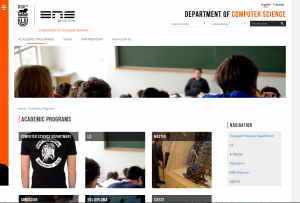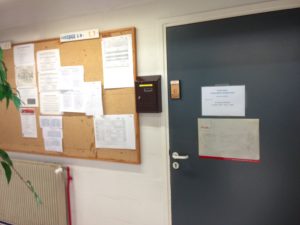DI website
The DI website is upgrated to two new complementary area:
- The official web site: http://informatique.ens-lyon.fr/
- The internal web site: http://www.ens-lyon.fr/DI

The DI website is upgrated to two new complementary area:

The applicant will develop a research project within the scientific spectrum of the LIP, or in a new research area that harmoniously interfaces with the current spectrum. This research project will be consistent with the teaching objectives. She/he will have experience in the proposed research area, with supporting publications or software development at the highest international level. She/he may be led to take “research management” responsibilities.
This position is widely open: external French and International applications are strongly encouraged.
The professor will become a member of the Computer Science teaching department of ENS de Lyon. She/he will be in charge of courses with strong emphasis on the implementation and experimentation aspects of Computer Science, such as: programming projects, compilation, systems, networks, architecture, etc. In line with the missions of the Ecoles Normales Supérieures, she/he will lead the students towards academic careers in these areas. It is expected that the professor will actively participate in the architecture of the curriculum. International applications are welcome, as the courses can be taught in English.
How to find S. Zeitounian, she is very helpful for all your deals with the DI?
You can reach easily the administrative office (LE 237), only 6 steps
Open from Monday to Friday
9:00am-12:00pm
1:00pm-5:00pm

General Outline
The Master 2 in Computer Science is composed of classes and winter schools from September 10, 2018 to January 25, 2019, followed by an internship from January 28 to June 15, 2019. See details below.
Latest Information
Updated schedule and latest info available on the read-only password-protected pad (handed out during the pre-course meeting):
https://pad.inria.fr/p/r.7e3a9396c0b060bfc755a346325a79f2
List of Courses (for full description follow the link CRxx):
Winter Schools: There are two winter schools taking place during weeks 48 (starting on Monday, Nov. 26) and 49 (starting on Monday, Dec. 3) . During these weeks, the courses stop and are replaced by the schools, which last the whole week. Topics will be announced later on.
Pre-course Meeting: A pre-course meeting will take place on Monday, September 10, 2018 at 9.30am, Amphi B. Attendance to this meeting is mandatory for all students. The general organization of the year and a description of the courses will be provided. Courses start on Monday, September 10, at 1:30pm.
Training Period: A mandatory training period takes place from Monday, January 21 up to mid June. An information session about topics and locations for the training period will be organized in September. Basically, the goal is to research in a laboratory (anywhere on earth), write a report and make an oral presentation in the end.
Schedule: Courses start September 10 at 1:30pm. Autumn holidays are October 27-November 4. Winter holidays are December 22-January 6. Exams will be held on week 3 (starting Monday Jan. 14), for a subset of courses. Again, the detailed weekly schedule will be available on the Inria pad mentioned above. This page will be read-only and updated on a regular basis, check it often.
Rules of the Game: To obtain their degree, CS Master students must complete 60 credits including the internship (30 credits), two winter schools (3 credits each) and four courses (4 credits each) in the above list of CR1 to CR17. To summarize, there are 52 mandatory credits out of 60 and 8 credits that can be picked elsewhere. While a typical choice by many students is 6 CR courses, 2 schools and the internship, the extra courses for the 8 credits can be chosen elsewhere, e.g. CS courses in the M2 offered by Univ. Lyon 1, or courses from other ENS departments.
Complex Systems: There is an exception for the orientation ‘Complex Systems’. See details at
http://www.ixxi.fr/enseignement/master_systemes_complexes
for course offering. For the validation, the two winter schools are not mandatory for complex systems students, only 4 CR courses and the training period are mandatory, so after mandatory stuff there remains 14 credits instead of 8 to validate, using a selection of courses from the orientation.
Note that ‘Complex Systems’ is an orientation, not a separate M2. The only diploma delivered by ENS Lyon is M2 Informatique Fondamentale, and computer science must remain at the heart of the curriculum. In particular, the training period must be oriented towards research in core computer science (possibly applied to other disciplines).
Formal Validation: To meet the quality requirements of our program, all course choices must be approved by the academic tutor and the head of the Master 2 program. Administrative registration to chosen courses is mandatory and takes place in late September, after a trial period.
Please refer to the rules of the Master here
Contact: Yves Robert
All informations about the L3 IF for 2018-2019 are/will be available on the L3 pad (the password is l3info18):
https://pad.inria.fr/p/r.d202fb7f4eefd48267b01716b7a89d06
A mandatory meeting (lots of useful informations about the year) will be on Monday, September 10, at 2pm in Amphi B.
Please check the page in French for further useful documents.
This page gathers useful informations for students following the first year of Master in Computer Science at École Normale Supérieure de Lyon.
The rules for the Master are here. See here for a description of the year.
Slides of the meeting of sept. 25th, 2018. Slides of the meeting of jan. 14th, 2019.
The internship defenses will take place on sept. 4th (the whole day) and 5th (in the morning), 2019, at ENS de Lyon. Stay tuned for the schedule of these presentations.
You can find here the “Livret du diplôme” for the academical year 2018-2019.
A meeting was organised on november 16th, at 16h15, in amphi B, about PhDs and PhD grants.
Théophile Dubuc and Antonin Dudermel are your class representants this year.
Courses offered: CGDI (David Coeurjolly), DBDM (Emmanuel Coquery et Marc Plantevit), ML (Marc Sebban), SV (Colin Riba), CS (Omar Fawzi), DS (Eddy Caron), CC (Omar Fawzi), PP (Philippe Audebaud), CA (Guillaume Hanrot et Stéphan Thomassé).
Schedule: note that the Integrated Project course will resume its activities on friday, january 25th, at 13.30
Here is the typical schedule. Local changes might apply.
Weekly schedules are available on a shared document — you should have received a link. If not, please write to Suzanne Zeitounian to get the access.
Holidays: 18/02-22/02, 15/04-22/04 — Final exams: between 23/04 and 30/04, schedule to be defined.
Here is the fiche de choix de modules (choice of courses), to be left in D. Hirschkoff’s “mailbox” before feb. 12th at noon.
Courses offered: CAP (Laure Gonnord), IT (Omar Fawzi, TDs), PEN (Éric Thierry, TDs), OA (Nicolas Bousquet), APPD (Anne Benoit), Integrated Project (Eddy Caron).
Here is the typical weekly schedule for the first semester.
Weekly schedules: 14-18 jan. – 7-11 jan. – 17-21 dec. – 10-14 dec. – 3-7 dec. – 19-23 nov – 5-9 nov – 22-26 oct – 15-19 oct – 8-12 oct – 1-5 oct 24-28 sept 17-21 sept. 10-15 sept.
Holidays: 29/10-3/11, and 22/12-5/1 — Final exams: january 21-25, here is the schedule.
Here is the fiche de choix de modules (choice of courses), to be left in D. Hirschkoff’s “mailbox” before sept. 26th at noon.
Midterm exams APPD nov. 5th, PEN nov. 5th, CAP nov. 8th, IT nov 8th, OA nov 20th.
Two research schools are organised, in the weeks 12-16 nov. and 26-30 nov. During those weeks, no course and no TD in M1 (language courses go on, and you are supposed to attend). See the appropriate web page.
The welcome reception of the Computer Science Department will be on sept. 17th, at 16.00, at the IFÉ (Institut Français de l’Éducation).
A mandatory meeting took place on sept. 10th, at 9h00, in Amphi A. See here the slides of the presentation, and here for slides of the centre de langues.
Students who were at ENSL in L3 in 2017-2018 did their administrative registration on friday, sept. 7th.
Profs. Nick Trefethen and Warwick Tucker, 15-19 January 2018
This year, ENS-Lyon is hosting visiting professors who are leading experts in two aspects of numerical computing.
Nick Trefethen (University of Oxford) is a well-known numerical analyst and the inventor of Chebfun, a MATLAB-based tool that solves all kinds of problems of rootfinding, integration, and differential equations fast and typically to 15 digits of accuracy.
Warwick Tucker (Uppsala University) is a leader in the area of rigorous numerical computing, where instead of computing numbers with no guarantees, one applies interval analysis and other methods to obtain guaranteed results — and even to rigorously prove mathematical theorems with the aid of the computer.
In this week, using a mixture of lectures and hand-on computer laboratories, the two professors will showcase some of the highlights of these two sides of numerical computing.
Schedule for ER02
| 8h15-10h | 10h15-12h | 14h15-16h | 16h15-18h | |
|---|---|---|---|---|
| Monday | Chebyshev (amphi B) | Chebyshev (lab rooms E001 and 125) | Validated numerics (amphi B) | |
| Tuesday | Validated numerics (amphi B) | Validated numerics (amphi B) | Chebyshev (amphi B) | Chebyshev (lab rooms E001 and 125) |
| Wednesday | Chebyshev (amphi B) | Validated numerics (amphi B) | Validated numerics (amphi B) | |
| Thursday | Validated numerics (amphi B) | Validated numerics (amphi B) | ||
| Friday | Chebyshev (lab rooms E001 and 125) | Chebyshev (amphi B) | Exam (amphi B) |
For the part on Chebyshev:
For the part on Validated Numerics: